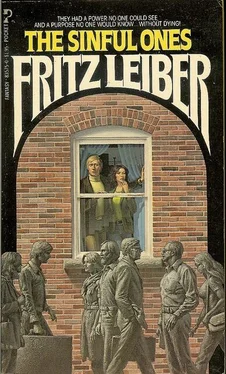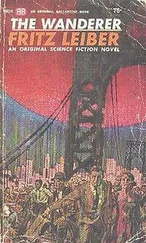“Why can’t we?” Carr asked suddenly. He leaned forward and caught her hand. “You say it’s possible to develop a feel for the pattern, to live according to it even though you’re aware.”
“You’re forgetting those others,” she reminded him. “They know my place in the pattern. I hope not, but they may guess yours. They’re watching. They’d know if I went back. And then they’d destroy me. For nothing will every satisfy them, until…”
At that moment they heard a step on the stairs.
Carr plunged the room into darkness. Jane came to him and they clung silently together, facing the door. No cracks of light showed around it. The burnt-out light-bulb in the hall had not been replaced.
The steps came closer. A faint and shifting light began to show through the cracks.
It is frightful to be in a deserted house. Even if the outdoors were a wilderness, its air would still carry that promise of other lives, which the walls of the deserted house bar out.
But to be in such a house and hear alien footsteps, and know that outside is a deserted city, where the men and women might be wax figures for all the help they could give you, and to know that beyond the deserted city is a deserted world, a deserted universe…
The footsteps stopped outside the door. There was a soft knocking. Carr’s hands tightened on Jane’s. A pause. The knocking was repeated, louder. Another pause. Again the knocking, louder yet.
A longer pause. Then a faint scratching that lasted for some time. Then a brief rustling.
Then the footsteps and light going away. Down the hall. Down the stairs. Silence.
Carr and Jane swayed. Their breath came in gasps. Carr went to the windows, pulled the drapes too, so that they formed a second barrier behind the shades. Then he struck a match, cupping it in his hand. It flared red, then yellow.
Jane said, “Look.”
Thrust under the bottom of the door was a folded sheet of paper.
Carr picked it up. He struck another match. They read the hastily scribbled note.
My Angry Passenger,
If you possibly can, meet me tomorrow evening at seven in front of the public library. Bring Jane, if you know where she is. I’ve made a very important discovery.
Your Mad Chauffeur.
Chapter Thirteen
The Black Shape
From behind the castellated black wall of warehouses, elevators, bridges, and cranes to the west, the setting sun sent a giant spray of dark red fire streaming through the immensity of air above the Chicago River. It bloodily edged the giant shoulders of the skyscrapers crowded around the Michigan Avenue bridge like a herd of gray mammoths stopping by the river for the night. It glared from their many faceted window-eyes to the west, but left those to the east in gloom—the small, wickedly intelligent window-eyes expressing the hard, alien thoughts that cities have been thinking since Ur and Alexandria and Rome. It turned the white tiles of the Wrigley Tower a delicate salmon pink and the golden trim of the Carbon and Carbide Building a rosy copper.
Far below the crimson light glimmered on the river, ruddily touched a black motor-barge, gleamed and faintly glittered on the asphalt and cement of the street bordering the river and the huge bridge crossing it, but hardly penetrated the dark rectangles below that were the windows to the bridge below the bridge, the street below the street—that cobbled and concrete underworld of rumbling trucks and parked cars, of coal-dust and dirt, with its own scattering of blinking and neon signs, that lay beneath the northern end of Chicago’s Loop district.
The same light struck color from the dresses, lost itself in the dark suits, of the streams of figures that moved like tired ants across the upper bridge, the purposeless, irregular cavalcade of tiny figures made tinier and more purposeless yet by the great buildings lowering above them.
In the heart of this throng, Carr and Jane drifted. Around them, shoulders and elbows eddied, meaningless voices swirled on the deeper currents of sound from the trucks and cars. Occasionally the stream whirled by them a briefcase or a parasol.
They were carried across the bridge and down the deep canyon beyond, past the black stairheads leading down to the lower-level streets at block intervals. They kept their eyes from the faces of figures around them, though Carr couldn’t help but notice certain oddities, such as a smoking bus with the crowd piling out of it, the figure of a man with a sandwich board, and the shape of a woman leading a large and ungainly black dog.
Finally they fronted the dark headland of the public library. Here they turned their faces toward each other, as two drivers might before the plunge.
They moved closer to each other, arm locking arm, hand grasping hand. Then they turned their faces forward and crossed the street. Here the crowd, augmented by streams seeking the Illinois Central pedestrian underpass, was thicker. The figure of the woman with the queer black dog was just ahead. They had taken about a dozen steps when a gap chanced to appear in the mass of bodies ahead of them letting them look down a rather long corridor of empty sidewalk. Carr felt Jane’s hand loosen on his, then tighten sharply.
Standing at the other end of the momentary corridor, facing them was the small dark man with glasses.
He saw them and smiled fantastically. Yielding to an impulse deeper than caution, he raised his hand in a theatrical gesture of greeting.
But then his glance shifted, shortened. He recoiled. His thick glasses flashed as his head jerked back. He clapped his hands to his chest, arms tight against his ribs, as if to protect his heart. Then, as the corridor which chance had brought into existence began swiftly to narrow, he looked again at Carr and Jane with a crouched frantic intentness.
Then, just as the corridor ahead closed, he cried out unintelligibly, bounded into the air like a puppet, and raced off.
Instantly three other figures detached themselves from the intervening crowd and ran after him. Two were men. The third was the woman with the dog.
Without a word, Carr and Jane started after them, stepping faster, faster, faster, until they were running too. Over heads and through holes in the crowd, Carr saw snatches of the chase—the small dark man weaving and ducking as he sough gaps in the crowd, every few steps taking one of those incredible bounds, the three pursuers sprinting after him.
The crowd did not react. No eyes turned, no people sprang aside, no shouts went up, no heads were poked from windows. Even the figures being darted and ducked around, missing being knocked down by inches—they never turned a hair, they went on smiling as sweetly, chattering as vivaciously, and peering as guardedly at good-looking young women, as if nothing had ruffled the charm of the afternoon.
Carr ran faster. The glimpse he caught showed him that the small dark man was holding his own, even beginning to gain. They had passed the library and were in the next block.
Then he saw Mr. Wilson motion urgently to Miss Hackman. She checked her pace and stopped, so that the crowd cut off Carr’s view of her.
A moment later there was a shape taking great effortless bounds—a coal-black wolfish shape that still carried the suggestion of the feline.
The small dark man looked back once, thrust up from the crowd like a hand puppet. Then he ran frantically a few steps farther and darted into a haberdashery store.
The black shape was at his heels.
One second, two, three—then from the store began to come shrill screams of terror and agony that sliced the heart.
Carr felt a great wave of nausea. Here, he saw in an unwilling flash of thought, was an allegory of this universe’s whole history—those screams crying out death and horror and pain, a murderer loose in the house of life, catlike cruelty at the cosmos’ core, destruction holding a match to the earth’s fuse—and the machine-men going about their patterned business with their minds black, their eyes blind, their ears unhearing.
Читать дальше









